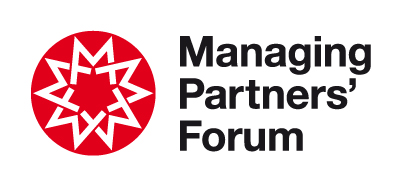The second MTT session of 2020 was hosted online, using Zoom for an interactive video meeting. It followed the usual MTT format of a keynote presentation followed by an audience Q&A. Managing Partners’ Forum founder and CEO Richard Chaplin chaired the meeting and moderated the Q&A session.
Kevin Doolan and Alexis Caught presented the findings of their research on millennials working in professional firms. Do they buy into the historic models or are they seeking something different? And if they are seeking something different, what are the implications for firms and partners? Doolan is a partner at the Møller Institute in Cambridge and teaches business development and pricing at Harvard Law School. Consultant Alexis Caught, who studied law, but is not a lawyer, specialises in generational issues in professional services.
When Doolan and Caught, started working together, they noticed immediately that their communication styles are very different, but they appreciated the benefit of including different perspectives in their research. As a millennial, Caught felt well-placed to conduct interviews with law firm associates and uncover their true feelings and opinions.
Millennials are driving new trends
The research was triggered by the different behaviour of the first millennial cohort of associates. The first signal was exits. While professions are well known for their ‘up or out’ culture, turnover increased significantly, and firms became concerned that too many associates were leaving. One firm reported 48% attrition at two years. As a firm’s profit from each associate goes up every year, higher attrition rates at two or three years had a significant effect on profits. Firms realised that losing their brightest and best associates – their future partners – would impact their long-term success.
When US firms hiked associate pay, their corporate clients used this to negotiate lower fees. They were also concerned about losing their top talent back to private practice. But it was clear that more money was a sticking plaster for poor job satisfaction.
The Harvard Service-Profit Chain model shows that happy teams have higher retention and are better at their jobs. People who are happy in their jobs stay longer and get better at what they do. Clients dislike team changes because each time someone new comes in they need to get up to speed, so in effect, the clients are paying for them to learn. Happier staff means better retention and better client service, and client satisfaction drives profitability.
It is therefore important to identify and address sources of friction that affect job satisfaction. Doolan and Caught highlighted some of the issues affecting intergenerational teams. Partners tend to give associates brief instructions, but millennials are looking for more detail. Unlike previous generations, they have the confidence to question established processes and they are disconcerted by the hierarchical nature of legal work – the client instructs the partner, who then instructs the associate. Millennial associates are looking to be part of a team effort, but there is a communication disconnect: millennials don’t like phone calls and prefer to engage online, while most clients still prefer a phone call to a text. This may resolve with time as the client base matures.
Intergenerational tension points
Millennials are maturing – their average age is 33 – and there is a new generation, Gen Z, who are entering the workforce and again challenging the norms. Doolan highlights common intergenerational tension points:
- Attitudes and approaches to work
- Different communication styles
- Attitudes to teamworking
- Values and attributes
However, millennials’ attitude to work and careers is creating recruitment and retention issues for organisations and disrupting their long-term strategic planning, including expansion and succession, particularly as they are beginning to dominate the workforce. For example, GE moved their headquarters from Connecticut to the Boston waterfront where it is easier to recruit millennials.
The millennial mindset
Organisations are putting more effort into understanding the millennial mindset and Caught’s face-to-face interviews revealed the gap between millennial thinking and professional services work culture. For example, partners assumed that associates were leaving because they couldn’t cope with long hours, while the associates were frustrated by the inefficiency of working long hours and the lack of direct feedback. Different generations learn in different ways and millennials have been educated to collaborate. So, it follows that they prefer regular feedback to an appraisal looking back over six months.
Interviewees said they wanted to feel part of the firm’s future. They questioned whether firms’ strategy of constant growth and increased revenue targets were sustainable. They were ambitious but weren’t seeking partnership. The difference between the millennial cohort and those who came before is that they are confident, proactive and like to be in control of their careers.
Caught’s findings highlighted that firms need to move away from the traditional command and control relationship to one that recognises the value that associates bring to their teams. In this respect, millennials are improving law firm culture.
He highlighted the factors that shape our attitudes and approach to work:
Our attitudes are shaped by world events in our formative years:
- Cold war – Boomers needed to listen to the government
- Thatcherism – Gen X are very independent (there is no such thing as society)
- Tony Blair – Millennials, (education, education, education) constantly tested so always looking for feedback and approval
Our approach to work is shaped by how we communicate:
- Boomers – the telephone
- Gen X – the mobile/smartphone
- Millennials – digital, online, text
But generations can learn from each other. Partners tell millennials you can’t build client relationships over emails, says Caught. But millennials grew up making friends in chatrooms.
Creating a cross-generational culture
A successful workplace culture means learning to value what different generations bring to the team. Doolan, who teaches at Harvard, appreciates the status quo being challenged by new technology. For example, Zoom meetings during the Covid-19 lockdown are more personal than a call as you see people face-to-face in their own surroundings – and this is converting boomers to online communication.
Engagement strategies
The following initiatives have helped professional services keep millennials engaged:
Boomerangs – people move on, but we may want them to return. Some accounting firms make a point of staying in touch with their alumni. As millennials tend to change jobs after two or three years, they can even plan for them to return with new experiences and skills.
Mentoring and reverse mentoring – reverse mentoring enables associates the confidence to introduce new ideas at partner level (for example online relationship building) and influence the strategic direction of the firm.
Work-life integration – millennials grew up studying on laptops. Firms are becoming more relaxed about presenteeism and focusing more on deliverables. Covid-19 will embed that in all businesses.
Diversification of training – let people focus on what they are good at and build teams of people with different and complementary skills so that everyone can bring their whole self to work.
Six ways for leaders to build strong cross-generational teams
- Listen to associates and partners and find out what they really need and want
- Ask their opinion – even if it isn’t acted on, they will appreciate being involved
- Flexibility – don’t continually reinvent the wheel; give people scope to try new things
- Mentor – proactively encourage face-to-face interaction (in person or via Zoom). Boomers are loyal to the firm; Gen X are loyal to themselves and millennials are loyal to their manager.
- Notice them – find out how they are doing. Firm leaders are regularly alarmed by people who never complain, but leave because they are not fulfilled
- Impact – acknowledge the impact of leaders and managers – around 40% of people leave their jobs because they are unhappy with their direct line manager
Finally, the discussion returned to the Harvard Service-Profit chain showing that employee and customer satisfaction are key to professional services retaining their position as trusted advisers particularly in today’s challenging business environment.
This was followed by a debate on whether the lockdown would produce opportunities for new ways of working that would incorporate the different requirements of generations Y and Z.
Joanna Goodman

